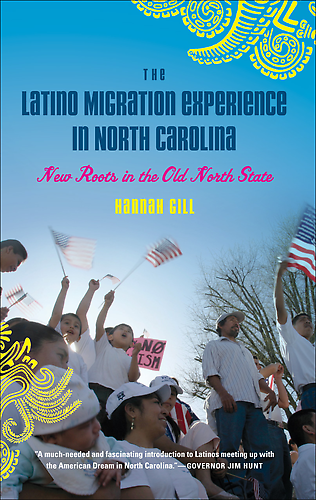When our three-year-old runs off to another part of the house to play and suddenly becomes quiet, you know that she is either very focused on whatever she is playing with or has done something she shouldn’t have. In either case, something is going on.
Well, here in the office of the North Carolina Council of Churches it is often quiet, and much like my three -year-old, you know something is going on!
I’ve only been here a week and I’ve already been exposed to the numerous programs that the Council has going on. They have an online lectionary resource; a program to promote healthy living in a Christian context; an environmental advocacy group; extensive North Carolina policy work; and numerous resources on farmworker and immigration issues.
Coming from a church which has a large Latino population, I am very interested in immigration issues and I had a great opportunity to attend a clergy breakfast on immigration with Chris Liu-Beers on Tuesday. The breakfast brought in clergy, Presbyterian to Pentecostal, from all over Alamance County and a few from several counties away. Alamance, in particular, has been a battleground for immigration since the local sheriff, Terry Johnson, enthusiastically joined the 287 (g) program. This program allows local authorities to detain individuals and to check their immigration status. Many people have ended up being deported for minor traffic violations, and Sheriff Johnson is currently under investigation by the US Department of Justice for racial profiling.

After listening to some of the stories from these local pastors, I can see why he is being investigated. Two stories in particular stuck out in my mind. One pastor described a nearby fishing hot spot, once frequented by many people from the community, regardless of race. However, within the last two years police began arresting Latinos for fishing without a license while letting Anglos off without so much as a slap on the wrist. Another participant described a family living without heat or much food. The family’s grandmother was very sick from a thyroid problem, a very treatable condition. However, she was afraid to seek medical care because of racial profiling and the threat of getting arrested.
From the outset I was outraged and ashamed at what was happening in Alamance County and in the United States as a whole. But it didn’t end there, Dr. Hannah Gill, an anthropologist from UNC, came to talk to the clergy about the immigrant population in North Carolina, and specifically in Alamance County. What she had to say really brought things into perspective. Immigration is not a new phenomenon in North Carolina; we have had immigrant workers for many years, well before “immigration reform” became a political platform.
In fact, a majority of Latinos in North Carolina are either natural born citizens, or are here legally (through a work visa, or permanent residency). Additionally, these Latino families have been here a longer than me! I consider myself a North Carolina native because I’ve lived here almost all of my life, around 23 years. But I was born in New Jersey. Many Latinos who get labeled as “immigrants” were born here in North Carolina, and are second or third generation Americans.
Now, it shouldn’t matter where people come from for them to be our neighbors. After all, in Luke’s Gospel it is the Samaritan, a foreigner, who is the neighbor to the man who was robbed and beaten. In John’s Gospel, it was a Samaritan woman, a foreigner, who first proclaims that Jesus is the Messiah. In the Gospels, it doesn’t matter where these people are from, they are still neighbors and they still share in the Christian witness.
But this information highlighted the grotesque difference between reality and what is portrayed by the mainstream media. I am sick of the fear mongering, sick of the misinformation, sick of politicians playing with people lives and families for their own political gain. And the clergy at this breakfast were sick of it as well. The outrage and shame were real and palpable, but the hunger and drive to stop the injustice was also real. The participants realized that the way things are are not the way things have to be. The clergy present networked with each other, shared some of what they have been doing in their community, and picked up various resources provided by Chris and the North Carolina Council of Churches.
While the outrage and shame stemming from a system which is so ingrained and prolific in our country can be paralyzing and lead to hopelessness; the work of these local pastors and the work of the North Carolina Council of Churches is a light in the darkness.
And although the work may be quiet, just like my daughter, you know it is focused work. And we are not afraid to get into trouble if that’s what it takes to get the work done.
For more information about upcoming breakfasts and ways to get involved in your church, visit the NC Religious Coalition for Justice for Immigrants.
–Tim Hetzel, Duke Divinity Intern

